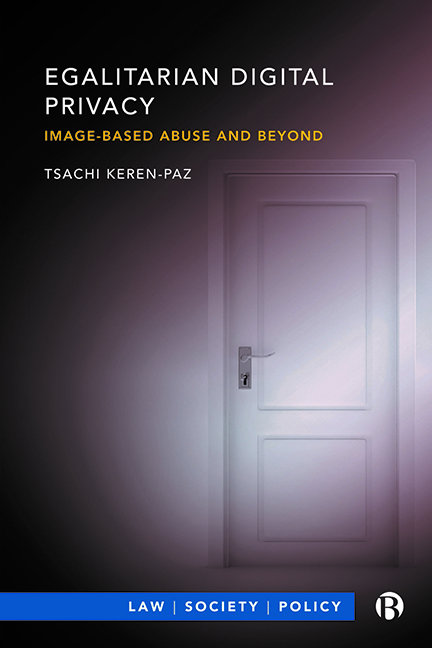Book contents
- Frontmatter
- Dedication
- Contents
- Acknowledgements
- Series Editor’s Preface
- 1 Introduction
- 2 Setting the Ground: The Intermediary Liability Debate and Framing Issues
- 3 First Principles and Occupiers’ Liability: The Case against Immunity
- 4 Property and Privacy: The Case for Strict Liability
- 5 Property and Privacy: Objections and Possible Extensions
- 6 The Policy Debate: Uniqueness of Harm from NCII
- 7 The Policy Debate: Freedom of Expression and Financial Costs of Filtering
- 8 The Easy Case for Viewers’ Liability: Child Pornography and Apportionment of Liability
- 9 Viewers’ Liability: Intention and Objective Fault
- 10 The Power of Property: Strict Liability for Viewing NCII
- 11 Scope of Liability for Breaches of Privacy
- 12 Is Suing Viewers Practicable?
- 13 Conclusion
- References
- Index
13 - Conclusion
Published online by Cambridge University Press: 17 January 2024
- Frontmatter
- Dedication
- Contents
- Acknowledgements
- Series Editor’s Preface
- 1 Introduction
- 2 Setting the Ground: The Intermediary Liability Debate and Framing Issues
- 3 First Principles and Occupiers’ Liability: The Case against Immunity
- 4 Property and Privacy: The Case for Strict Liability
- 5 Property and Privacy: Objections and Possible Extensions
- 6 The Policy Debate: Uniqueness of Harm from NCII
- 7 The Policy Debate: Freedom of Expression and Financial Costs of Filtering
- 8 The Easy Case for Viewers’ Liability: Child Pornography and Apportionment of Liability
- 9 Viewers’ Liability: Intention and Objective Fault
- 10 The Power of Property: Strict Liability for Viewing NCII
- 11 Scope of Liability for Breaches of Privacy
- 12 Is Suing Viewers Practicable?
- 13 Conclusion
- References
- Index
Summary
I have attempted in this book to expand the very substantial and growing literature, and policy discussions, around intimate image abuse, by focussing on issues around civil law, platform and viewers’ liability. The book advances the field by engaging with ways to tackle these forms of abuse beyond the criminal law (the dominant and familiar approach).
Policy-wise, the book highlights several important points. The harm from intimate image abuse is the product of deep societal currents; it is systemic and gendered. Crucially, it is produced by many, not only by those who upload or actively distribute these images. As such, the response should target both internet intermediaries and viewers. Intermediaries are not merely the providers of passive and neutral fora in which such abuses occur. Rather, by hosting these images (and also by aggregating, although this has not been the focus of my argument), they both actively contribute to the claimant’s right-violation and to the ensuing harm, and do so for profit; their business model relies on user generated content and they disproportionately benefit from illegal (and especially salacious) content. Therefore, not only should they not enjoy post-notice immunity (as the US regulation grants them) but they should actively filter such images and should be strictly liable for any remaining non-consensual intimate images they host. In reality, hosts sell the claimant’s images without the claimant’s consent. As long as the sellers of chattels – ‘normal’ stolen property – are strictly liable to the original owner, as is currently overwhelmingly the case, so should hosts. But even if we have reasons to think that strict liability of sellers of chattels is too harsh, there are reasons to believe, as explained in the book, that strict liability of hosts is still justified. Based on the inalienability paradox, I have concluded that whether we should treat intimate images (or more broadly private information) as the subject of property right, as is currently at least the de facto situation, or as too precious to be sold voluntarily (and hence as inalienable), the seller of such images – and indeed the buyer – cannot be in a better position of the one who sells or buys stolen chattels without the owner’s authorization.
- Type
- Chapter
- Information
- Egalitarian Digital PrivacyImage-based Abuse and Beyond, pp. 224 - 226Publisher: Bristol University PressPrint publication year: 2023



